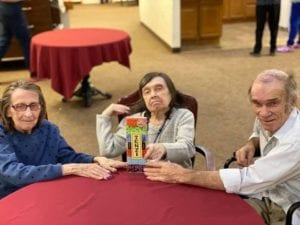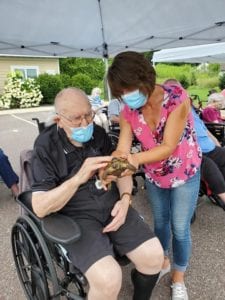 Did you know… data shows that many people 50+ are affected by social isolation? As you or your loved one ages, you’re identified as a high risk for developing social isolation. There are many reasons that over time you or your loved one will isolate themselves, some without even knowing. Although there are many reasons that one would isolate themselves, there are common factors that lead to isolation such as death of friends or family, loss of mobility, not being able to live independently, etc. Having a healthy social life is crucial to incorporate into your daily life. Having constant social interactions throughout the day helps keep you and your loved ones physically, emotionally, and mentally fit.
Did you know… data shows that many people 50+ are affected by social isolation? As you or your loved one ages, you’re identified as a high risk for developing social isolation. There are many reasons that over time you or your loved one will isolate themselves, some without even knowing. Although there are many reasons that one would isolate themselves, there are common factors that lead to isolation such as death of friends or family, loss of mobility, not being able to live independently, etc. Having a healthy social life is crucial to incorporate into your daily life. Having constant social interactions throughout the day helps keep you and your loved ones physically, emotionally, and mentally fit.
Benefits of Social Interactions
- Reduces stress & lowers blood pressure
- Those who are socially active tend to handle stress better which leads to overall increases in cardiovascular health and an improved immune system
- Improves overall cognitive function

- Lower risk of developing depression
- Longer lifespan
- Increased fitness (More likely to exercise as a form of social interaction)
- Can reduce the progression of declining health
- Keeps their mind sharp and intellectually engaged
- Increases quality of life
- Greater self-esteem/self-worth
- Prevent general cognitive decline such as memory loss, Alzheimer’s, and forms of dementia
Risks of Social Isolation
As you and your loved ones age, it becomes harder to create friendships when you’re not in a living situation that allows daily interactions. This can leave your loved ones vulnerable to loneliness which can have negative effects on them both mentally and physically. Most seniors fall into social isolation due to physical ailments, loss of a spouse or a loved one, mobility problems, real or perceived cognitive decline, and less availability of family members. Loneliness can cause physical and mental decline, obesity, diabetes, stress, anxiety, and even an earlier death.
“When you take one step to reach out to people, when you meet with others and share their thoughts and sufferings, infinite compassion and wisdom well up within your heart. Your life is transformed.” -Daisaku Ikeda
Get Involved
Getting involved is the first step to becoming social. At Woodstone, we have Community Life Coordinators that set up activities throughout the day. You are never forced to go to anything that you don’t want to which means you can be as involved as you want to be. When you enter into the Woodstone Community, there are many different groups and activities that we offer daily. You can learn something new, explore hobbies, join fitness groups and even volunteer.
After moving into a Senior Living Community, there are a few tips to creating relationships with those around you. One of the first steps to take would be to talk to the other residents and find out their interests. Schedule times to chat over coffee or attend any of the activities together. Our Community Life Coordinators can be a big help when it comes to social interactions. Make sure to get the weekly/monthly schedule from them to get an idea of what activities are offered and when. That way, you can plan out your week with the other residents. Participating in volunteer opportunities can also help get you involved not only with other residents, but your community. Aside from building relationships with those around you, building and maintaining positive relationships with family is important. At Woodstone, we find that our families are very interactive with their loved ones. They look forward to our daily Facebook posts to see what their loved ones are up to each day! Along with family, this includes grandchildren. Grandchildren love the support and wisdom from their grandparents. One of our residents from our Active Living community looks forward to watching his grandson play basketball throughout the year from his room.
How Does Woodstone Increase Social Interactions?
At Woodstone, our Community Life Coordinators are designed to help fulfill your loved ones mental, physical and social needs. We offer many opportunities that your loved ones can get involved with throughout the week. The social interactions that we offer give your loved ones the support and engagement that they need for their mental and physical well-being. For many seniors, continued socialization doesn’t just happen on its own. It takes time, energy and commitment to maintain these relationships.
Best,
Danielle Morrow
Marketing Specialist



